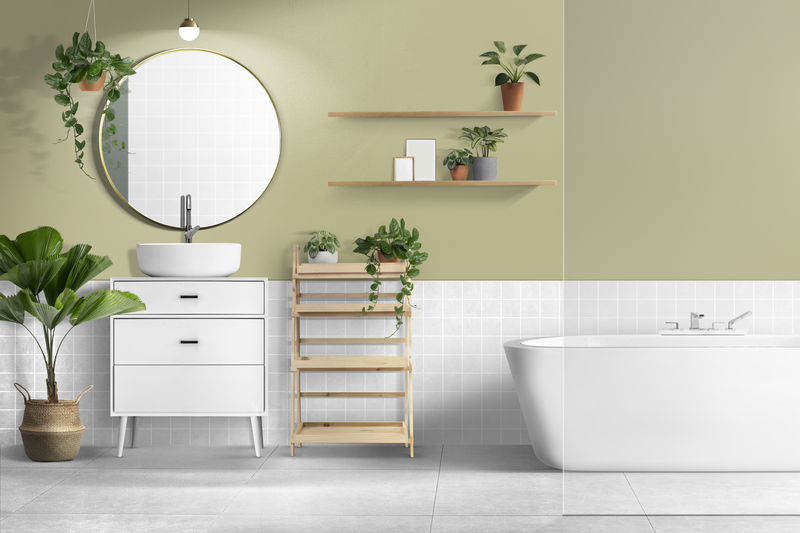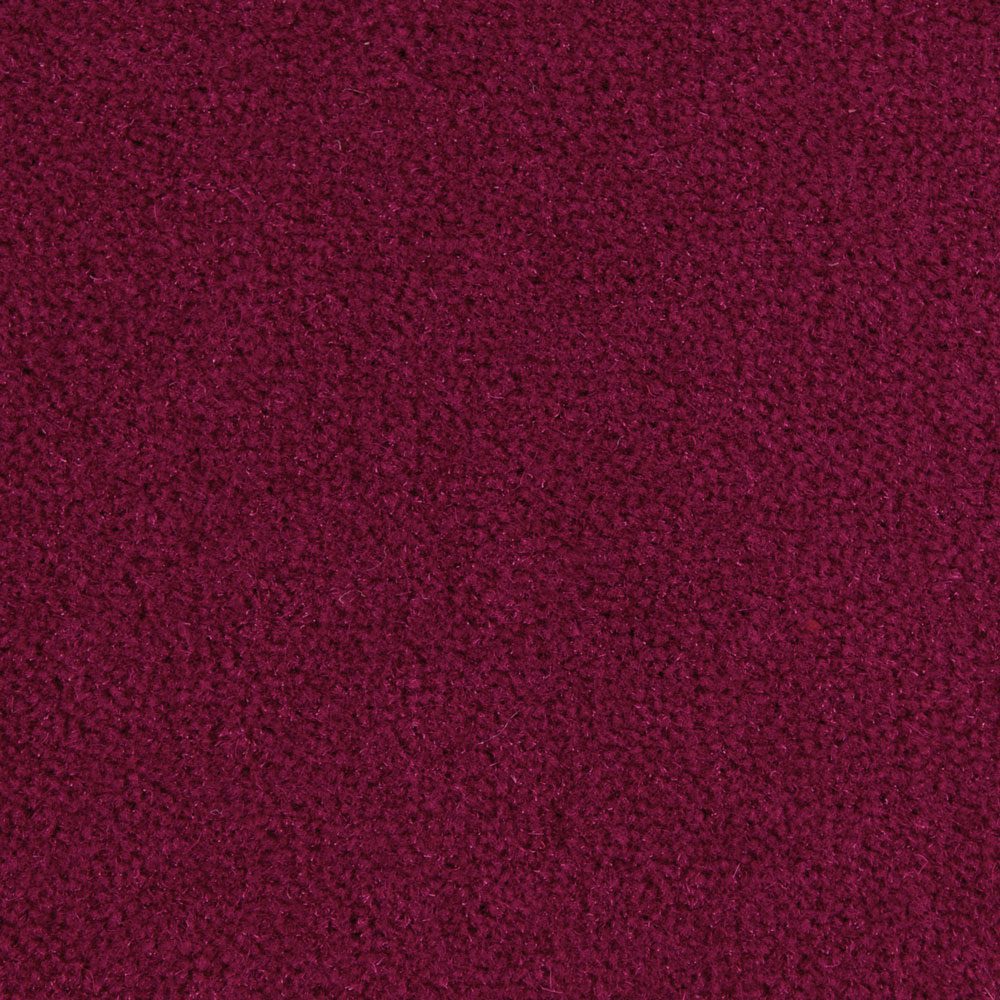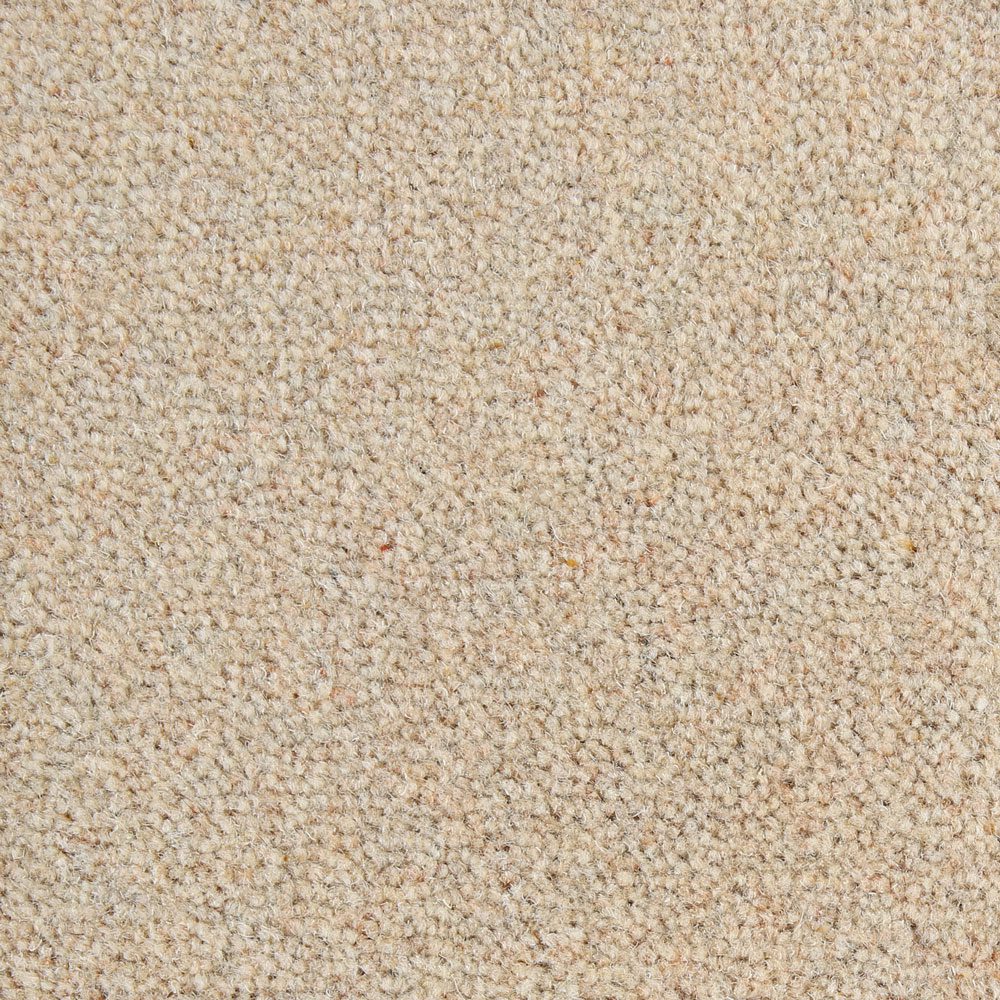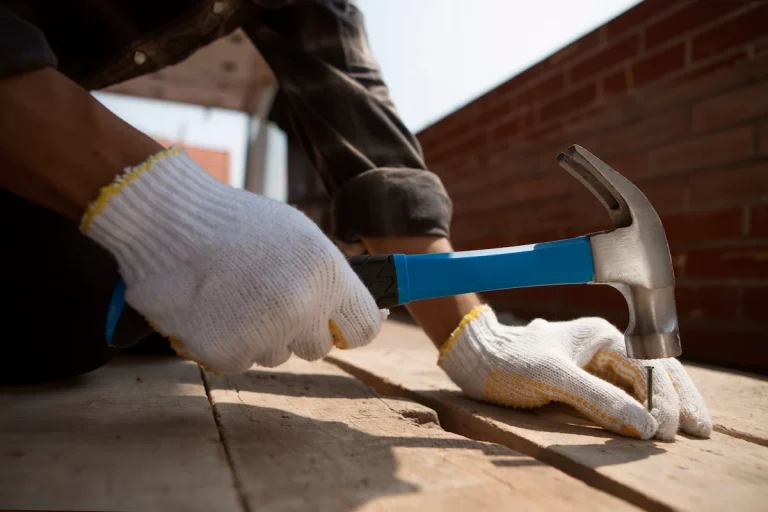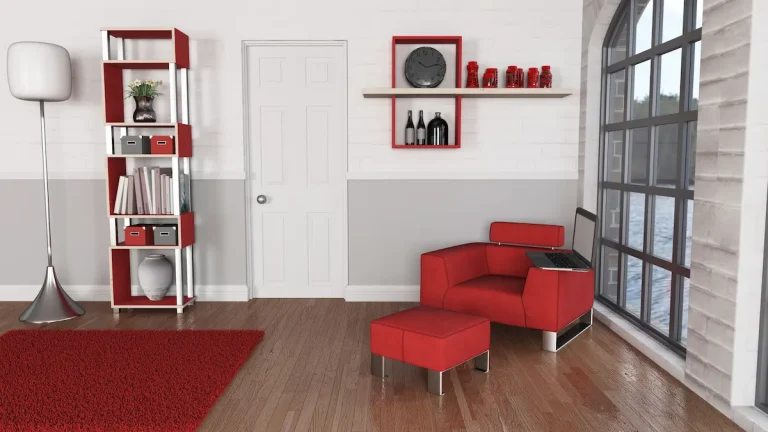Understanding how to choose flooring for bathroom can transform it into a stylish and functional oasis. With unique challenges like moisture, humidity, and slip hazards, it’s essential to consider factors such as water resistance, durability, and maintenance needs.
This guide covers the key considerations for selecting bathroom flooring, explores the pros and cons of popular materials like porcelain ceramic tiles, vinyl, and natural stone, and offers tips for keeping your floors looking their best.
Dive in to find the perfect fit for your sanctuary, considering flooring options that meet both your interior taste and practical requirements! Consider both functionality and visual appeal when selecting your bathroom flooring.
How to Choose Flooring for Bathroom
When choosing the right bathroom flooring, there are several crucial factors to consider that can significantly impact both functionality and aesthetic appeal, especially in a high-traffic family environment.
a. Water Resistance
Water resistance is a critical factor when selecting flooring for bathrooms, as the high humidity levels and potential for water damage can significantly affect the longevity of your investment. Choosing the right flooring material not only enhances the aesthetics of your bathroom but also safeguards it against costly repairs and maintenance over time.
When exploring suitable water-resistant flooring options, it is essential to consider a variety of choices that bring both style and function. Options such as porcelain ceramic tiles and luxury vinyl are excellent.
- Porcelain Tiles: Known for their durability and less porous surface, porcelain tiles are an excellent option, offering both an elegant look and resistance to moisture.
- Luxury Vinyl: This type of flooring has gained popularity for its ability to mimic natural materials while providing exceptional waterproof qualities.
- Stone or Ceramic: These timeless options also provide a moisture-resistant barrier, though careful installation is crucial to ensure they perform well over time.
- Granite Marble Travertine: Beautiful stones that are water-resistant and enhance aesthetic appeal with their unique textures.
- Mosaic Tiles: These are small, intricately designed tiles that are water-resistant and add a stylish touch to your bathroom.
Ultimately, investing in waterproof flooring not only prevents water damage but also enhances comfort and ease of maintenance, making these choices ideal for any modern bathroom. Incorporating underfloor heating can also add to the comfort and functionality of your space.
b. Durability
Durability is paramount in bathroom flooring, especially in households with high-traffic family members, as flooring must withstand significant wear and tear over time. Durable materials like stone tiles ensure longevity and resilience.
Choosing the right flooring becomes crucial for maintaining a beautiful and functional space. Options like ceramic tiles and various forms of natural stone, like granite and marble, are particularly favoured due to their impressive lifespan and ability to resist scratches and dents, ensuring they remain looking new even after years of use.
- Ceramic Tiles: Known for their water resistance and ease of maintenance, these tiles can last a lifetime when properly installed.
- Engineered Wood: This option combines the beauty of hardwood with enhanced durability and moisture resistance, making it suitable for bathrooms.
- Natural Stone: Options such as granite or slate offer unique aesthetics and unparalleled durability, albeit at a higher cost. Stone flooring remains a luxurious choice for bathroom renovations.
Both choices provide an elegant look while standing up to the challenges posed by moisture and foot traffic, making them excellent contenders for bathroom renovations.
c. Slip Resistance
Slip resistance is a vital consideration for bathroom flooring, ensuring that the surfaces remain safe to walk on, particularly when wet, as this is often a high-risk area where falls can lead to serious injuries. Choosing appropriate materials significantly contributes to a safer environment, enabling peace of mind when entering a bathroom after a shower or bath. It’s crucial to explore various options that not only emphasise aesthetic appeal but also offer an enhanced grip underfoot, especially in moisture-prone areas.
Among the popular choices, textured tiles serve as an excellent option, featuring surface designs that elevate traction while also allowing for impressive water drainage. Contractors often recommend these for their functionality and safety.
Vinyl flooring is another contender known for its durability and slip-resistant finishes, making it a practical choice for families. Vinyl tiles are easy to maintain and offer a non-slip surface, ideal for high-traffic bathrooms.
Rubber tiles can offer both comfort and safety, suitable for any bathroom décor style.
Regular cleaning is essential to maintaining a non-slip surface; even the best materials can lose their efficacy if dirt and mould accumulate.
Thus, prioritising slip-resistant solutions while ensuring their upkeep is crucial for a safe bathroom environment.
d. Maintenance and Cleaning
Maintenance and cleaning requirements can greatly influence your choice of bathroom flooring, as some materials demand more regular upkeep than others, making it essential to consider how each option aligns with your lifestyle and preferences. Regular maintenance is key to preserving the look and functionality of your bathroom flooring.
For example, when comparing porcelain tiles with natural stone, one quickly realises that porcelain tiles are often hailed as a user-friendly choice due to their inherent durability and ease of cleaning. Regular cleaning with a simple mop and mild detergent is typically sufficient to keep them looking pristine.
In contrast, natural stone requires more careful attention and specialised cleaners to avoid damaging its surface.
- Porcelain Tiles: Easy to maintain, resistant to stains and moisture.
- Natural Stone: Needs regular sealing and specific cleaning products.
- Vinyl Flooring: Versatile and low-maintenance, ideal for busy households.
- Hardwood: While beautiful, it needs more care to prevent water damage.
- Engineered Wood Flooring: Combines the look of hardwood with easier maintenance and better moisture resistance.
Ultimately, assessing the maintenance needs of each flooring type can help guide you towards the best solution for your bathroom, ensuring both aesthetics and practicality are maintained.
e. Budget
Establishing a budget is essential when selecting bathroom flooring, as it dictates the range of materials you can consider without compromising on quality.
When exploring your options, it’s important to keep in mind that affordability doesn’t have to come at the expense of durability and aesthetic appeal. Budget flooring choices such as vinyl tiles offer a waterproof solution that can mimic the appearance of natural stone or wood, making them a stylish yet practical option.
On the other hand, laminate flooring provides a cost-effective alternative, featuring various designs and textures that can enhance any bathroom space. When paired with a bath mat, it offers additional comfort and safety. While considering these options, think about the following factors:
- Longevity: How long will the flooring last with regular use?
- Maintenance: What kind of upkeep is required to keep the flooring in good condition?
- Installation Costs: Will you be doing it yourself, or hiring a professional?
These considerations can help ensure that the selected flooring not only fits within your budget but also stands the test of time and looks great.
Pros and Cons of Popular Bathroom Flooring Types
Regarding selecting bathroom flooring, understanding the advantages and disadvantages of popular types such as ceramic, porcelain, vinyl, natural stone, laminate, and engineered wood can help you make an informed decision tailored to your needs.
1. Ceramic or Porcelain Tile
Ceramic and porcelain tiles are among the most popular choices for bathroom flooring due to their water-resistant properties and exceptional durability. Whether you choose ceramic, porcelain, or stone tiles, these materials provide a robust defence against water.
These versatile materials not only offer a robust defence against moisture but also significantly reduce the risk of mould and mildew, making them a healthy option for your home.
The wide variety of designs ensures that one can find the perfect aesthetic to match their personal style. Homeowners can also appreciate the ease of maintenance that ceramic and porcelain tiles provide, allowing for quick clean-up with just a damp cloth or mop. In addition, these tiles are compatible with underfloor heating, adding to their appeal.
It’s important to note that while they are quite durable, the tiles can experience chipping or cracking if subjected to heavy impact. However, with proper installation and care, they can be part of a long-lasting bathroom design. The advantages often outweigh the drawbacks, granting these tiles their esteemed reputation in home design.
2. Vinyl
Vinyl flooring presents an excellent budget-friendly option for bathrooms, offering a wide range of designs that are both stylish and easy to maintain. Vinyl tiles are especially popular for their affordability and practicality.
Among the various types available, luxury vinyl stands out due to its remarkable aesthetic appeal and durability. This particular flooring option is designed to mimic high-end materials like hardwood and stone, all while providing a waterproof nature that makes it ideal for humid environments. Vinyl is not only easy to maintain but also a slip-resistant flooring option, which is crucial for safety in wet areas.
Homeowners appreciate that luxury vinyl is not only simple to install but also requires minimal maintenance over time. From traditional sheets to plank and tile formats, vinyl comes in numerous styles, ensuring everyone can find something to match their interior decor. The ease of cleaning makes it a practical choice for busy households.

See product: Karndean Art Select Oak Premier Dusk Oak
3. Natural Stone
Natural stone flooring, such as granite, marble, and travertine, adds a touch of elegance to any bathroom, but it comes with unique considerations that homeowners should be aware of before making their choice.
These stunning surfaces not only enhance the overall aesthetic but also bring a sense of luxury to the space. Potential buyers need to consider several factors when opting for these materials.
- Maintenance Needs: Regular sealing is essential to protect the stone from stains and moisture damage.
- Durability: While tough, some types may chip or scratch more easily than others.
- Natural Variations: The inherent patterns and colours can vary significantly, making each piece unique.
Ultimately, understanding both the beauty and challenges of natural stone flooring will help ensure a satisfying choice in the long run.
4. Laminate
Laminate flooring is an affordable and appealing solution for bathroom flooring, although it may not withstand moisture and water damage as well as other materials. It is a popular choice for bathroom renovations due to its adaptability and cost-effectiveness.
In bathrooms, where water exposure is a significant concern, this flooring option offers various benefits that can attract homeowners seeking both style and budget-friendliness.
Laminate is available in numerous designs that mimic the appearance of natural wood or tiles, making it easy to achieve an elegant look without a hefty price tag. It’s crucial to consider that while laminate is cost-effective, the potential for water-related issues means that adequate precautions, such as proper sealing and maintenance, must be taken to ensure longevity.
- Aesthetic Value: Provides a modern look without overspending.
- Cost-Effectiveness: Generally cheaper than both tiles and hardwood.
- Durability: It might not withstand excessive moisture.
Understanding these factors can help in making well-informed decisions regarding flooring choices in a bathroom setting.

See product: Quick-Step Classic Desert Greige Oak
5. Engineered Wood
Engineered wood flooring offers the appearance of traditional wood while being more resilient to humidity, making it a viable option for bathroom settings. Its design makes it particularly suitable for bathroom environments where moisture levels are higher.
Its layered construction not only enhances durability but also provides a stunning appearance that often rivals solid wood. This flooring is designed to withstand fluctuations in moisture better than conventional options, making it ideal for high-humidity areas. The maintenance of engineered wood is minimal—regular sweeping and occasional damp mopping suffice to keep it looking pristine.
With features such as resilience to moisture damage, sustainably sourced options and availability of various finishes and styles, engineered wood makes a practical and attractive choice for homeowners looking to enhance their space without the constant upkeep that traditional wood may require.

See product: Ted Todd Warehouse Furrow – Extra Wide Plank (2.2m x 220mm)
Best Flooring for Bathroom
Choosing the best flooring options for your bathroom involves evaluating materials such as ceramic tiles, vinyl, and natural stone, each offering distinct advantages tailored to your specific bathroom needs.
1. Ceramic or Porcelain Tile
Ceramic and porcelain tiles are often regarded as the gold standard for bathroom flooring due to their excellent water-resistant qualities and impressive durability.
These tiles possess a remarkable ability to withstand the rigours of moisture-laden environments, making them an ideal choice for areas prone to spills and humidity.
Homeowners will find that these materials offer aesthetic flexibility, allowing for a wide range of colours, patterns, and finishes to suit any design preference. Maintenance is another strong point; a quick wipe with a damp cloth or a mild cleaner can maintain the tiles’ pristine condition with minimal effort.
- Water resistance prevents common issues like mould and mildew.
- Durability ensures long-lasting performance, saving on replacement costs.
- Versatility in design accommodates various styles, from contemporary to traditional.
By choosing ceramic or porcelain tiles, individuals can achieve a stylish and functional bathroom that resonates well with both personal preferences and practical needs.
2. Vinyl
Vinyl flooring remains a popular choice for bathroom renovations, thanks to its budget-friendly nature and waterproof properties, allowing for a variety of design choices.
With its durability and ease of installation, this flooring option caters to the specific demands of wet environments. It can be quickly laid down over existing floors without the need for extensive preparation, making it a preferred choice for DIY enthusiasts. Vinyl offers an impressive array of colours, patterns, and textures, enabling homeowners to seamlessly integrate their own aesthetic preferences into bathroom designs.
- Maintenance: Maintaining vinyl flooring is quite simple; it usually requires just regular sweeping and occasional mopping with a mild cleaner.
- Comfort: Compared to tiles, vinyl provides a softer surface, making it more comfortable for prolonged standing.
- Affordability: Budget-conscious renovations can greatly benefit from its cost-effective nature.
The advantages of vinyl flooring make it an attractive option for enhancing the functionality and style of any bathroom.
3. Natural Stone
For those seeking a luxurious touch, natural stone flooring such as granite, marble, or travertine can transform any bathroom into a stunning retreat.
Utilising these materials not only elevates aesthetic appeal but also reinforces the sense of elegance within the space. Each type of stone showcases its own unique patterns and colours, making it a truly one-of-a-kind choice for homeowners.
The durability of natural stone is another fantastic feature; when properly maintained, it can withstand the test of time, resisting wear and tear better than many synthetic options. It’s essential to be mindful of the maintenance required to keep it looking its best. Regular sealing is recommended to prevent staining and moisture damage.
To make informed decisions, consider the following:
- Style Cohesion: Ensure the stone complements your overall design theme.
- Slip Resistance: Some stones can be slippery when wet, so choose wisely.
- Cleaning: Use pH-balanced cleaners to avoid damaging the surface.
Ultimately, investing in natural stone is not only a statement of luxury but also a commitment to quality and longevity in home design.
Conclusion: Choose the Right Flooring for Your Bathroom
Choosing the right flooring for your bathroom is a decision that involves understanding various flooring options, considering factors like durability, water resistance, and maintenance needs while also keeping your budget in mind. Ensuring you select the most suitable material is crucial for the longevity of your space and the comfort of its use.
When evaluating the options, it’s essential to weigh the pros and cons effectively.
- Durability: Some materials are better suited for high traffic areas, while others may be more prone to scratches.
- Water Resistance: Bathrooms are prone to moisture, so selecting a flooring type that can withstand water is imperative.
- Maintenance: Consider how easy the flooring is to clean; some require special care.
Always remember that this choice not only affects the aesthetic appeal but also the overall functionality of the bathroom.
Taking time to research and visit showrooms before making a commitment will ensure a more informed decision that aligns with personal preferences and practical needs. So, visit the TEKA Flooring showroom in Peterborough today to meet the expert anda find the highest quality bathroom flooring for your home.
Read also:


























